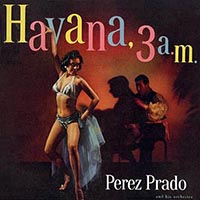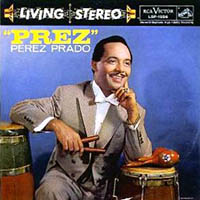Perez Prado: Havana 3 a.m.

Following the successes of his previous albums, mostly reissues of proven hits in Mexico, Pérez Prado was entitled to do his own progressive thing at least for one album. Havana, 3 A.M. sneaked past the dance-music censors at RCA and kicked down the doors for acceptance of authentic Latin music in the U.S. Immediately into the first track, "La Comparsa," we hear the full flowering of the Prado sound: searing, blaring trumpet over heavy rhythm in very spare arrangements. "The Freeway Mambo" is definitive, one of Prado's unsung best. That the music is also suitable for dancing seems irrelevant. This is the sound of the dancer on the jacket, of pre-Castro Cuba at night, of Spanish-influenced cities and African-influenced hill country. It is louder than bullfight music (even the ballads), absolutely direct and brash, yet so deftly and compellingly arranged that it never tires. A timeless classic, Havana, 3 A.M. is worth obtaining in both its original form and a simulated-stereo reissue.
Perez Prado: "Freeway Mambo"
Perez Prado: "Prez"

Though outstanding, "Prez" is annoying for many reasons. First, Prado needs only one nickname ("El Rey del Mambo"), even if some misguided people confer it also on Tito Puente. And "Prez" is bound to upset fans of the "Prez" in jazz. Second, this album is as jazzy, or at least smooth and sophisticated, as any by Prado. And too slick and polished is very un-Prado, even dull, no matter how many jazz and Latin-percussion greats are in on the session. Third, it is ubiquitous; high sales of this uncharacteristic album no doubt turned off many potential Prado-philes. Fourth, it was reissued on CD with a completely misleading title change. In short, it is where Prado claims integrity and range, not sensation and fun. ~ Tony Wilds
Perez Prado: The Voodoo Suite and Exotic Suite of the Americas

The pairing of Perez Prado's two orchestral tone poems on one CD is something of an occasion to celebrate. Recorded seven years apart, The Voodoo Suite and The Exotic Suite of the Americas are the defining moments in Prado's long career as king of the mambo. Though The Voodoo Suite, with its larger-than-life orchestra -- six saxophones, three trombones, seven drummers, six trumpets, and more -- was equal parts a Latin dance band and a jazz orchestra, its tight charts by Shorty Rogers made it a dramatic beast to wrestle and a sublime one to listen to. For all the critics who had discussed Prado in the derogatory, The Voodoo Suite gave them something to listen to, because here was the first popular attempt at the marriage of Cuban, African, and jazz elementals ever attempted in a work that was essentially for the general populace a mood record. The loping horn arrangements, bluesy solos, and hypnotic drumming took it outside the realm of mood music and placed it squarely into the camp of progressive big band jazz. To prove it was no fluke, the original album was rounded out with the other tracks that appear here from another session: "St. James Infirmary," "In the Mood," "I Can't Get Started," and others which burned the Latin jazz flame just as bright. On The Exotic Suite of the Americas, Prado took a decidedly more laid-back approach and made his score more cinematic in scope and tone. Relying deeply on textured strings and found-sound objects to accent the jazz orchestra, this is 16 minutes of pure, exotic ecstasy. And again, Prado, always wanting to round out his records and give the paying customer something to sink his butt into, offered mambo renditions of "Son of a Gun," "El Relicario," "Midnight in Jamaica," and more from another session later in 1962. The folks at Bear Family have done a fine job remastering the original tapes and assembling the greatest-ever statements by Prado. This is essential.
Perez Prado: "St. James Infirmary"
Perez Prado/Rosemary Clooney: A Touch of Tabasco

On paper, this unlikely pairing of American popular vocalist Rosemary Clooney (who nearly defined the 1950s as a stylist) and Cuban percussionist and bandleader Pérez Prado seemed to be a disaster in the making. The end result is quite the opposite. Recorded during two sessions in July and August of 1959, this is simply one of the loveliest albums in either artist's catalog. The music is lively and colorful but retains Clooney's smooth and mellow character, and Prado's trademark arrangements and experiments with percussion, texture, and harmony. Apparently, Clooney had some trouble with pronunciation initially, but was coached by her husband, Puerto Rican actor Jose Ferrer (who wrote the original album's liner notes) and became a quick study. This merging of Latin and American standards is a tour de force that features some of the hottest session players in the biz including drummers Leo Acosta and Earl Palmer, as well as horn players Paul Horn and Ollie Mitchell. Highlights of the set include "Mack the Knife," "Sway," a pair of Cole Porter tunes -- "Bali Hai," and "You Do Something to Me" -- as well as highly original readings of "Corazon de Melon," "Cu-Cu-Rru-Cu-Cu Paloma," and "Adios."
Perez Prado/Rosemary Clooney: "Sway"